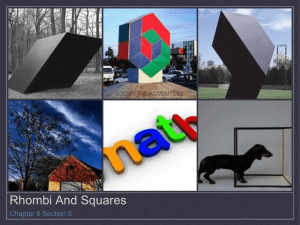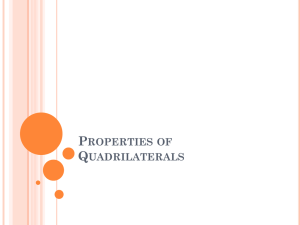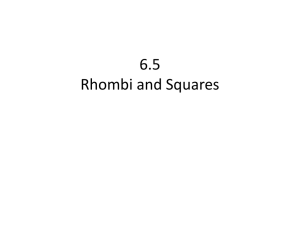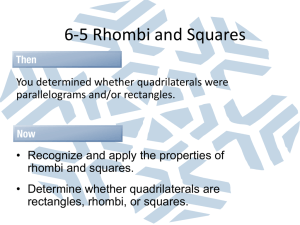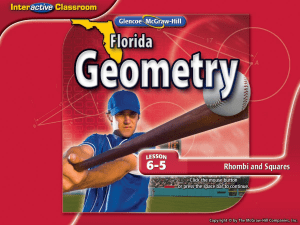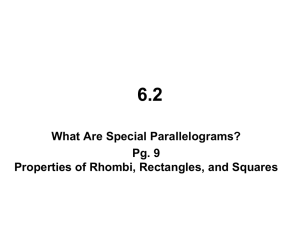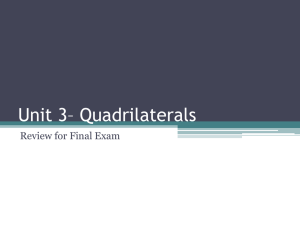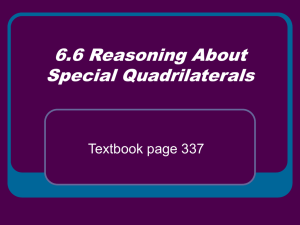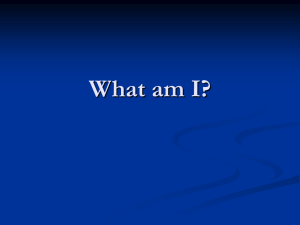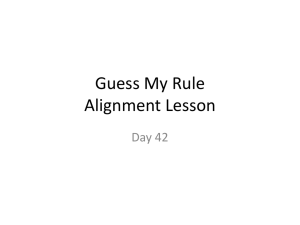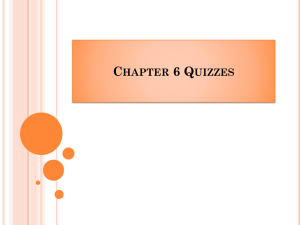Rhombi and Squares
advertisement
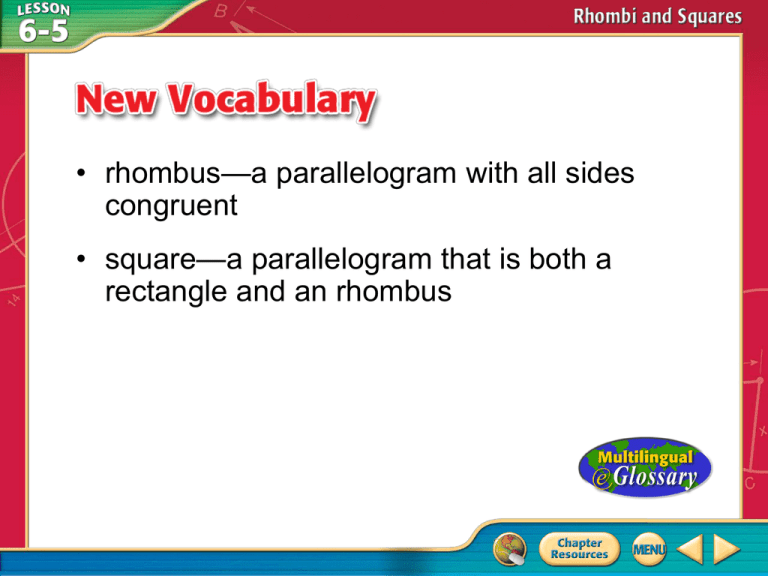
• rhombus—a parallelogram with all sides congruent • square—a parallelogram that is both a rectangle and an rhombus Use Properties of a Rhombus A. The diagonals of rhombus WXYZ intersect at V. If mWZX = 39.5, find mZYX. Use Properties of a Rhombus Since WXYZ is a rhombus, diagonal ZX bisects WZY. Therefore, mWZY = 2mWZX. So, mWZY = 2(39.5) or 79. Since WXYZ is a rhombus, WZ║XY, and ZY is a transversal. mWZY + mZYX = 180 79 + mZYX = 180 mZYX = 101 Answer: mZYX = 101 Consecutive Interior Angles Theorem Substitution Subtract 79 from both sides. Use Properties of a Rhombus B. ALGEBRA The diagonals of rhombus WXYZ intersect at V. If WX = 8x – 5 and WZ = 6x + 3, find x. Use Properties of a Rhombus WX WZ WX = WZ 8x – 5 = 6x + 3 2x – 5 = 3 2x = 8 x = 4 Answer: x = 4 By definition, all sides of a rhombus are congruent. Definition of congruence Substitution Subtract 6x from each side. Add 5 to each side. Divide each side by 4. A. ABCD is a rhombus. Find mCDB if mABC = 126. A. mCDB = 126 B. mCDB = 63 C. mCDB = 54 D. mCDB = 27 A. B. C. D. A B C D B. ABCD is a rhombus. If BC = 4x – 5 and CD = 2x + 7, find x. A. x = 1 B. x = 3 C. x = 4 D. x = 6 A. B. C. D. A B C D Proofs Using Properties of Rhombi and Squares Write a paragraph proof. Given: LMNP is a parallelogram. 1 2 and 2 6 Prove: LMNP is a rhombus. Proofs Using Properties of Rhombi and Squares Proof: Since it is given that LMNP is a parallelogram, LM║PN and 1 and 5 are alternate interior angles. Therefore 1 5. It is also given that 1 2 and 2 6, so 1 6 by substitution and 5 6 by substitution. Answer: Therefore, LN bisects L and N. By Theorem 6.18, LMNP is a rhombus. Is there enough information given to prove that ABCD is a rhombus? Given: ABCD is a parallelogram. AD DC Prove: ADCD is a rhombus A. Yes, if one pair of consecutive sides of a parallelogram are congruent, the parallelogram is a rhombus. B. No, you need more information. 1. 2. A B Use Conditions for Rhombi and Squares GARDENING Hector is measuring the boundary of a new garden. He wants the garden to be square. He has set each of the corner stakes 6 feet apart. What does Hector need to know to make sure that the garden is square? Use Conditions for Rhombi and Squares Answer: Since opposite sides are congruent, the garden is a parallelogram. Since consecutive sides are congruent, the garden is a rhombus. Hector needs to know if the diagonals of the garden are congruent. If they are, then the garden is a rectangle. By Theorem 6.20, if a quadrilateral is a rectangle and a rhombus, then it is a square. Sachin has a shape he knows to be a parallelogram and all four sides are congruent. Which information does he need to know to determine whether it is also a square? A. The diagonal bisects a pair of opposite angles. B. The diagonals bisect each other. C. The diagonals are perpendicular. D. The diagonals are congruent. A. B. C. D. A B C D Classify Quadrilaterals Using Coordinate Geometry Determine whether parallelogram ABCD is a rhombus, a rectangle, or a square for A(–2, –1), B(–1, 3), C(3, 2), and D(2, –2). List all that apply. Explain. Understand Plot the vertices on a coordinate plane. Classify Quadrilaterals Using Coordinate Geometry It appears from the graph that the parallelogram is a rhombus, rectangle, and a square. Plan If the diagonals are perpendicular, then ABCD is either a rhombus or a square. The diagonals of a rectangle are congruent. If the diagonals are congruent and perpendicular, then ABCD is a square. Solve Use the Distance Formula to compare the lengths of the diagonals. Classify Quadrilaterals Using Coordinate Geometry Use slope to determine whether the diagonals are perpendicular. Classify Quadrilaterals Using Coordinate Geometry Since the slope of is the negative reciprocal of the slope of the diagonals are perpendicular. The lengths of and are the same so the diagonals are congruent. Answer: Check ABCD is a rhombus, a rectangle, and a square. You can verify ABCD is a square by using the Distance Formula to show that all four sides are congruent and by using the Slope Formula to show consecutive sides are perpendicular. Determine whether parallelogram EFGH is a rhombus, a rectangle, or a square for E(0, –2), F(–3, 0), G(–1, 3), and H(2, 1). List all that apply. A. rhombus only B. rectangle only C. rhombus, rectangle, and square D. none of these A. B. C. D. A B C D
